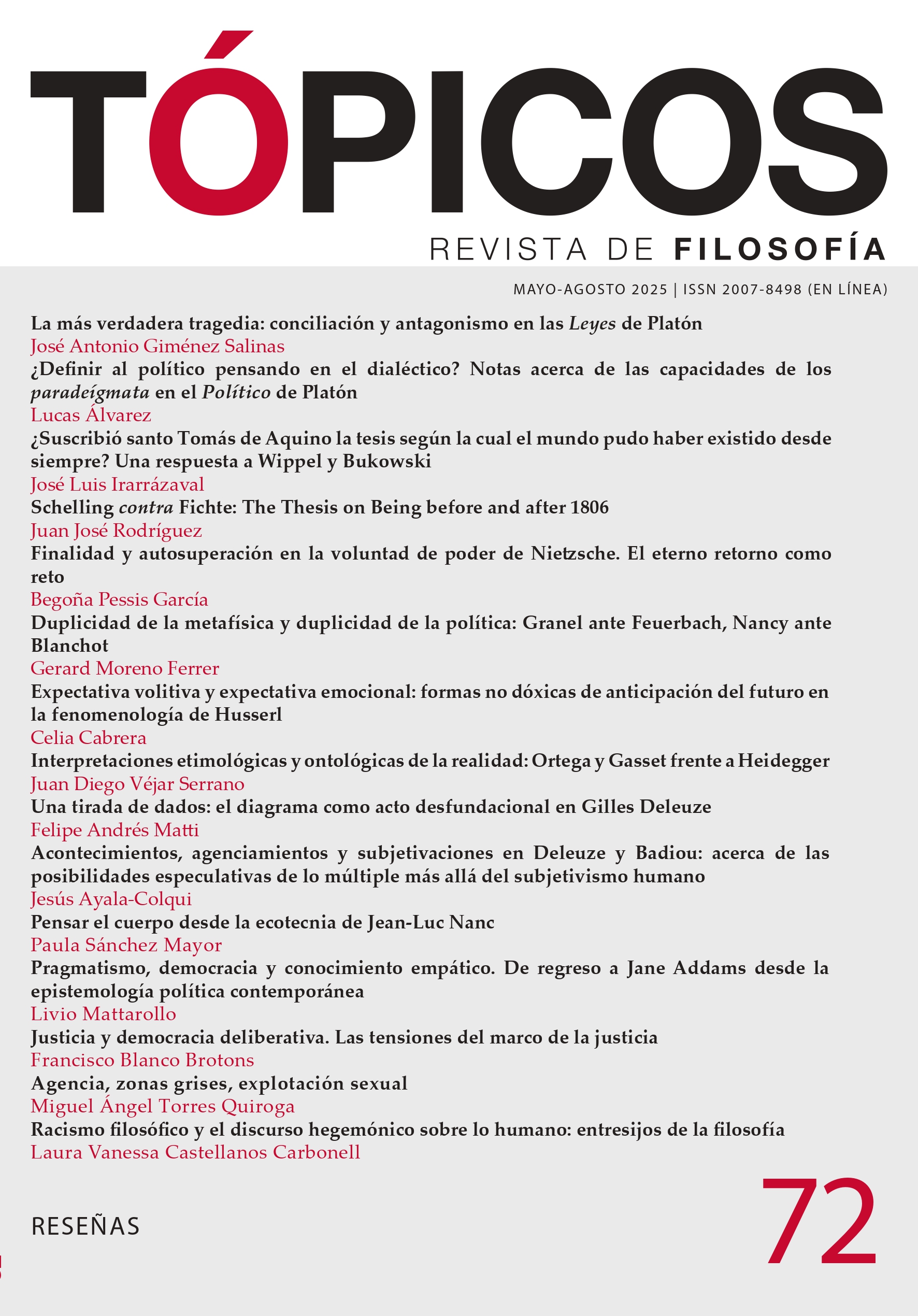Published 2025-02-19
Keywords
- tragedy,
- ancient quarrel between philosophy and poetry,
- Laws,
- mimesis
Copyright (c) 2025 Tópicos, Revista de Filosofía

This work is licensed under a Creative Commons Attribution-NonCommercial-NoDerivatives 4.0 International License.
How to Cite
Abstract
This paper examines the quarrel with the tragic poets in Laws, VII 817b-d, by emphasizing, on the one hand, fundamental differences with the more famous quarrel of the Republic, and by arguing, on the other hand, for a strong (and not merely rhetorical) reading of the central claim of the passage, namely, that the very political constitution proposed in the dialogue is itself the “truest tragedy.” Assuming this perspective, I show that the constitution of Magnesia is the best possible tragedy insofar as it makes possible the greatest realization of the community’s life, recognizing, appealing to, and integrating human passions and weaknesses within itself. We are confronted with a notion of tragedy that, while recognizing as its starting point the antagonism proper to the tragic genre, aspires to common happiness as the most beautiful culmination of the human drama.
References
- Aristóteles. (1957). Metaphysica. W. Jaeger (ed.). Oxford University Press.
- Aristóteles. (2010). De Arte Poetica Liber. R. Kassel (ed.). Oxford University Press.
- Bartels, M. R. (2017). Plato’s Pragmatic Project. A Reading of Plato’s Laws. Franz Steiner Verlag. https://doi.org/10.25162/9783515118057
- Capra, A. (2014). Plato’s Four Muses: The Phaedrus and the Poetics of Philosophy. Center for Hellenic Studies.
- Delgado, C. (2011). Indicios de una rehabilitación de la literatura en Platón a propósito de Leyes, 809e2-812b1 y 817a1-e1. Nova Tellus, 29(2), 87-115. https://doi.org/10.19130/iifl.nt.2011.29.2.388
- Derrida, J. (1972). La dissémination. Éditions du Seuil.
- Epicteto. (1916). Dissertationes ab Arriano digestae. H. Schenkl (ed.). Teubner.
- Diógenes Laercio (1972). Lives of Eminent Philosophers. Books 1-5. R. D. Hicks (trad.). Loeb Classical Library. Harvard University Press.
- Gadamer, H.-G. (1985). Platon und die Dichter. En Gesammelte Werke. 5. Griechische Philosophie. I (pp. 187-211). Mohr Siebeck.
- Giménez, J. A. (2019). La psicología moral de la marioneta. Conflicto y acuerdo en las Leyes de Platón. Ideas y Valores, 68(171), 137-159. https://doi.org/10.15446/ideasyvalores.v68n171.64537
- Giménez, J. A. (2021). El criterio del placer en las Leyes V 733a-734e. Méthexis, 33, 80-101. https://doi.org/10.1163/24680974-03301004
- Halliwell, S. (1984). Plato and Aristotle on the Denial of Tragedy. Proceedings of the Cambridge Philological Society, 30, 49-71. https://doi.org/10.1017/S0068673500004612
- Halliwell, S. (1996). Plato’s Repudiation of the Tragic. En M. S. Silk (ed.), Tragedy and the Tragic (pp. 332-349). Oxford University Press. https://doi.org/10.1093/oso/9780198149514.003.0022
- Halliwell, S. (2002). The Aesthetics of Mimesis: Ancient Texts and Modern Problems. Princeton University Press. https://doi.org/10.1515/9781400825301
- Heidegger, M. (1996). Gesamtausgabe. I. Abteilung: Veröffentliche Schriften 1910-1976. Band 6.1. Nietzsche. Vittorio Klostermann.
- Kuhn, H. (1941). The True Tragedy: On the Relationship between Greek Tragedy and Plato, I. Harvard Studies in Classical Philology, 52, 1-40. https://doi.org/10.2307/310955
- Kurke, L. (2013). Imagining Chorality: Wonders, Plato’s Puppets and Moving Statues. En A.-E. Peponi (ed.), Performance and Culture in Plato’s Laws (pp. 123-170). Cambridge University Press. https://doi.org/10.1017/CBO9781139061674.008
- Laks, A. (2008). The Laws. En C. Rowe y M. Schofield (eds.), The Cambridge History of Greek and Roman Political Thought (pp. 258-292). Cambridge University Press.
- Laks, A. (2010). Plato’s Truest Tragedy. En C. Bobonich (ed.), Plato’s Laws. A Critical Guide (pp. 217-231). Cambridge University Press.
- Laks, A. (2022). Plato’s Second Republic. An Essay on the Laws. Princeton University Press. https://doi.org/10.2307/j.ctv269fw2b
- Lisi, F. (1985). Einheit und Vielheit des platonischen Nomosbegriffes. Verlag Anton Hein.
- Männlein-Robert, I. (2013). Poetik: Komödie und Tragödie (VII 796e-817e) En C. Horn (ed.), Platon: Gesetze/Nomoi (pp. 123-142). Akademie Verlag. https://doi.org/10.1524/9783050064482.123
- Máximo de Tiro. (1994). Dissertationes. M. B. Trapp (ed.). Teubner.
- Meyer, S. S. (2011). Legislation as a Tragedy: On Plato’s Laws VII, 817B–D. En P. Destrée y F.-G. Herrmann (eds.), Plato and the Poets (pp. 387-402). Brill. https://doi.org/10.1163/ej.9789004201293.i-434.91
- Müller, J. (2013). Der Mensch als Marionette: Psychologie und Handlungstheorie. E n C. Horn (ed.), Platon: Gesetze/Nomoi (pp. 45-66). Akademie Verlag. https://doi.org/10.1524/9783050064482.45
- Naddaf, G. (2000). Literary and Poetic Performance in Plato’s Laws. The Society for Ancient Greek Philosophy Newsletter, 312, 1-15. https://orb.binghamton.edu/sagp/312
- Nietzsche, F. (1973). El nacimiento de la tragedia. A. Sánchez Pascual (trad.). Alianza.
- Nightingale, A. (1993). Writing/Reading a Sacred Text: A Literary Interpretation of Plato’s Laws. Classical Philology, 88(4), 279-300. https://doi.org/10.1086/367372
- Platón. (1901). Opera. II. Tetralogiae III-IV. J. Burnet (ed.). Oxford University Press.
- Platón. (1903). Opera. III. Tetralogiae V-VII. J. Burnet (ed.). Oxford University Press.
- Platón. (1907). Opera. V. Tetralogia IX. J. Burnet (ed.). Oxford University Press.
- Platón. (1926). Laws. R. G. Bury (trad.). Harvard University Press.
- Platón. (1978). Opera. IV. Tetralogia VIII. J. Burnet (ed.). Oxford University Press.
- Platón. (1982). Diálogos. IV. C. Eggers Lan. (trad.). Gredos.
- Platón. (1999). Diálogos IX. Leyes (libros VII-XII). F. Lisi (trad.). Gredos.
- Platón. (2004). The Laws. T. J. Saunders (trad.). Penguin Classics.
- Platón. (2016). Laws. M. Schofield (ed.). T. Griffith (trad.). Cambridge University Press.
- Plotino. (1966). Enneads I-VI. A. H. Armstrong (trad.). Harvard University Press. https://doi.org/10.4159/DLCL.plotinus-enneas.1969
- Pfefferkorn, J. (2021). Plato’s Dancing City: Why is Mimetic Choral Dance so Prominent in the Laws? En J. Pfefferkorn y A. Spinelli (eds.), Platonic Mimesis Revisited (pp. 335-358). Academia. https://doi.org/10.5771/9783896659798-335
- Schöpsdau, K. (1994). Platon. Nomoi. Buch 1-3. Übersetzung und Kommentar. Vandenhoek & Ruprecht.
- Schöpsdau, K. (2003). Platon. Nomoi. Buch 4–7. Übersetzung und Kommentar. Vandenhoek & Ruprecht.
- Stalley, R. (1995). Punishment in Plato’s Laws. History of Political Thought, 16(4), 469-487.
- Strauss, L. (1975). The Argument and the Action of Plato’s Laws. The University of Chicago Press.






